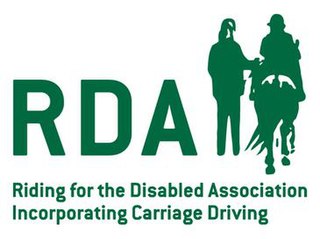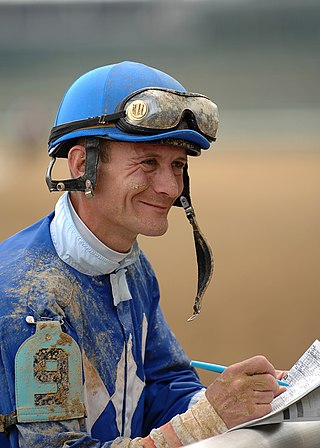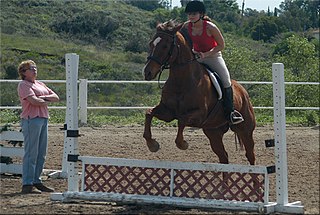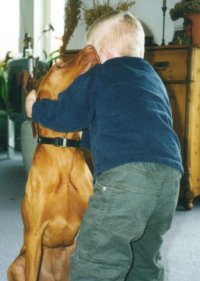
Parasports are sports played by people with a disability, including physical and intellectual disabilities. Some parasports are forms of adapted physical activities from existing non-disabled sports, while others have been specifically created for persons with a disability and do not have a non-disabled equivalent. Disability exists in four categories: physical, mental, permanent and temporary. At a competitive level, disability sport classifications are applied to allow people of varying abilities to face similar opposition.
A path is a route for physical travel – see Trail.

Occupational therapy (OT) is a healthcare profession that involves the use of assessment, intervention, consultation, and coaching to develop, recover, or maintain meaningful occupations of individuals, groups, or communities. The field of OT consists of health care practitioners trained and educated to support mental health and physical performance. Occupational therapists specialize in teaching, educating, and supporting participation in activities that occupy an individual's time. It is an independent health profession sometimes categorized as an allied health profession and consists of occupational therapists (OTs) and occupational therapy assistants (OTAs). OTs and OTAs have different roles, with OTs licensed to complete comprehensive occupational therapy evaluations. Both professionals work with people who want to improve their ability to participate in meaningful occupations.

The Riding for the Disabled Association (RDA) is a United Kingdom based charity founded in 1969 focused on providing therapeutic horse-riding, equestrian vaulting and carriage driving lessons to people with developmental and physical disabilities as well seeking to improve the lives of those with mental health difficulties. Princess Anne has been the organisation's President since 1985.

Horse training refers to a variety of practices that teach horses to perform certain behaviors when commanded to do so by humans. Horses are trained to be manageable by humans for everyday care as well as for equestrian activities, ranging anywhere from equine sports such as horse racing, dressage, or jumping, to therapeutic horseback riding for people with disabilities.

An equestrian helmet is a form of protective headgear worn when riding horses. This type of helmet is specially designed to protect the rider's head in the event of falls from a horse, especially from striking a hard object while falling or being accidentally struck in the head by a horse's hoof.
Linda Kohanov is an author, speaker, riding instructor, and horse trainer. Kohanov is best known in the field called "equine facilitated psychotherapy", and as the author of five books, The Tao of Equus: A Woman's Journey of Healing and Transformation through the Way of the Horse (2001), Riding between the Worlds: Expanding Our Potential through the Way of the Horse (2003), Way of the Horse: Equine Archetypes for Self Discovery (2007), The Power of the Herd: A Nonpredatory Approach to Social Intelligence, Leadership, and Innovation (2012) and The Five Roles of a Master Herder: A Revolutionary Model for Socially Intelligent Leadership (2016). Linda's books have been used as texts in university courses across the country and have received appreciative reviews in publications as diverse as Horse and Rider, Natural Horse, IONS Noetic Sciences Review, Shift, Spirituality and Health, Animal Wellness, The Equestrian News and Strides. Many courses in equine assisted therapy have her books as essential reading for example in the UK one of the growing number of equine facilitated Psychotherapy organisations IFEAL cites her books throughout their teaching.

A riding instructor is a person whose job it is to teach methods of horse riding to beginners and improve the intermediate and advanced rider's style and technique. A riding instructor may also serve as a coach for a rider in competition. Some instructors may work out of their own riding facility, others at a riding school or training center. With appropriate academic credentials, some may teach in a college or university equestrian studies program. Yet others freelance and travel from stable to stable.

Animal-assisted therapy (AAT) is an alternative or complementary type of therapy that includes the use of animals in a treatment. The goal of this animal-assisted intervention is to improve a patient's social, emotional, or cognitive functioning. Studies have documented some positive effects of the therapy on subjective self-rating scales and on objective physiological measures such as blood pressure and hormone levels.

Recreational therapy or therapeutic recreation (TR) is a systematic process that utilizes recreation (leisure) and other activities as interventions to address the assessed needs of individuals with illnesses and/or disabling conditions, as a means to psychological and physical health, recovery and well-being. Recreational therapy may also be simply referred to as recreation therapy, but in short, it is the utilization and enhancement of leisure.

Inclusion, in relation to persons with disabilities, is defined as including individuals with disabilities in everyday activities and ensuring they have access to resources and opportunities in ways that are similar to their non-disabled peers. Disability rights advocates define true inclusion as results-oriented, rather than focused merely on encouragement. To this end, communities, businesses, and other groups and organizations are considered inclusive if people with disabilities do not face barriers to participation and have equal access to opportunities and resources.

Equine-assisted therapy (EAT) encompasses a range of treatments that involve activities with horses and other equines to promote human physical and mental health. Modern use of horses for mental health treatment dates to the 1990s. Systematic review of studies of EAT as applied to physical health date only to about 2007, and a lack of common terminology and standardization has caused problems with meta-analysis. Due to a lack of high-quality studies assessing the efficacy of equine-assisted therapies for mental health treatment, concerns have been raised that these therapies should not replace or divert resources from other evidence-based mental health therapies. The existing body of evidence does not justify the promotion and use of equine-related treatments for mental disorders.
The International Association for Handicapped Divers is a non-profit organization with its headquarters in Middenmeer, the Netherlands. The organization was established in 1993, with the aim to promote, develop and conduct programs for the training in scuba diving of people with a disability. From 1993 to date (2008) IAHD have educated and certified over 5500 divers and dive professionals worldwide. As the IAHD is a non-profit foundation, all the people on the board are volunteers. There are also volunteers in regions around the world.
The Commission on Rehabilitation Counselor Certification is a national certifying organization for professional rehabilitation counselors. Based in Schaumburg, IL, it is an independent, not-for-profit organization whose purpose is to establish, maintain, and monitor a national certification program for Certified Rehabilitation Counselors, including maintaining a register of all certified counselors and providing certification status for the public. The commission also maintains and updates a Code of Professional Ethics for Rehabilitation Counselors under which all certified rehabilitation counselors must practice. The certification program is accredited by the National Commission for Certifying Agencies, the accrediting organization of the Institute for Credentialing Excellence.
The National Sports Center for the Disabled (NSCD) is a 501(c)(3) non-profit organization that began in 1970 providing ski lessons for children with amputations. Today, the NSCD is one of the largest therapeutic recreation organizations in the world, serving more than 3,000 children and adults with disabilities. The NSCD is based out of Winter Park Resort in Winter Park, Colorado, and Sports Authority Field at Mile High in Denver, Colorado.

The Thomas Equestrian Center is a program area on the Boy Scout Camp, "Camp Cedars," in Saunders County, Nebraska. The program was started by Walter Thomas in 1998 with only four horses. Today, the Thomas Equestrian Center is no longer run by Walter Thomas due to differences among the council leadership but previously was Home to a miniature horse, two miniature donkeys, two ponies, and twenty-two other horses.
Horses Healing Hearts (HHH) is a 501(c)3 charitable organization located in South Florida, United States. This psychoeducational program helps children whose parents suffer from the disease of addiction. While providing a safe and nurturing environment to build self-esteem and confidence by working with horses, HHH equips children with the tools to change their lives and break the generational cycle of addiction. It was founded in 2009 by Lizabeth Olszewski.
Patricia E. Kelly is an African-American cowgirl, founder, and CEO of the non-profit organization Ebony Horsewomen, Inc, in Hartford. She is a trained equestrian instructor certified as Master Urban Riding and Equine Husbandry instructor as well as Equine Assisted Growth specialist.

Cara Elizabeth Yar Khan is a disability advocate, public speaker and United Nations humanitarian.

Equine-assisted therapy or equine-assisted therapy on autistic people is a therapy using a mediating horse or pony. A session can take place on foot or on horseback. Equine-assisted therapy is one of the few animal-assisted therapies regularly studied for its effectiveness, and the most popular of all autism therapies.












